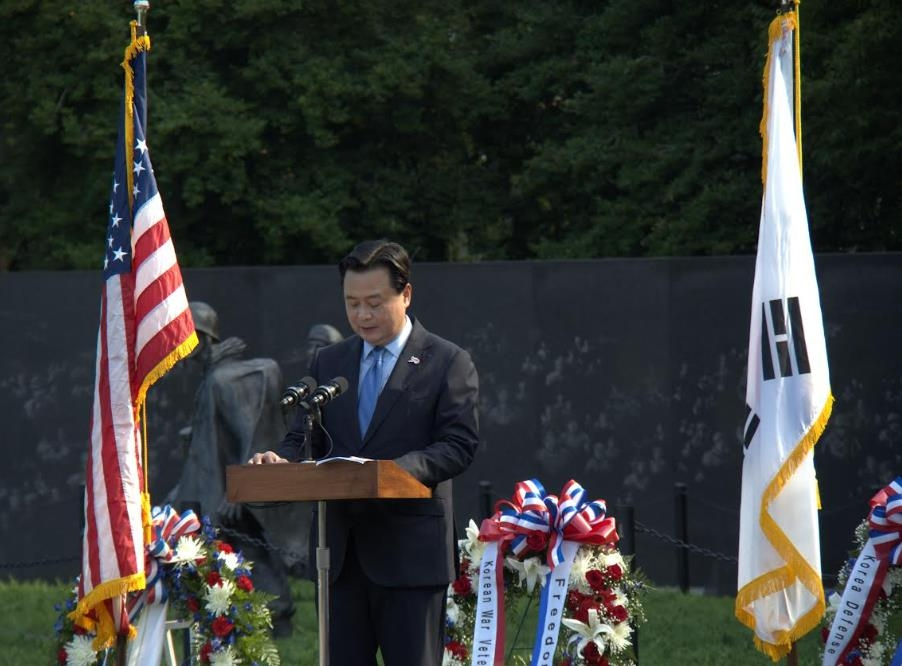 |
South Korean Ambassador to the United States Cho Hyun-dong delivers remarks during a ceremony marking the 70th anniversary of the Korean armistice in Washington on Thursday. (Yonhap) |
South Korea's ambassador to the United States stressed the importance of the South Korea-US alliance Thursday, highlighting the 70th anniversary of the Korean Armistice Agreement that ended the Korean War.
Ambassador Cho Hyun-dong also said that the alliance will continue to strengthen in the face of North Korea's evolving nuclear and missile threats.
"Even as I speak, Pyongyang is raising tensions by launching ballistic missiles and using brazen language threatening the use of nuclear weapons," Cho said during a ceremony marking the 70th anniversary of the Korean armistice.
"History has taught us that we must be strong enough to deter such aggression and to defend ourselves when necessary," he added. "North Korea's intensifying nuclear and missile threats will only invite an overwhelming defense posture from the alliance."
The 1950-53 Korean War ended 70 years ago and was followed by the US-South Korea Mutual Defense Treaty, which was signed on Oct. 1, 1953, forming the bilateral alliance.
Cho underscored the need to continue building a strong deterrence against North Korea's nuclear and missile threats, arguing that Pyongyang continues to seek the reunification of Korea by force.
"Seventy years have passed since the Armistice, but North Korea's ambition to unify Korea under communism remains unchanged. And its nuclear and missile threats continue to grow – seriously undermining peace and stability in the Indo-Pacific," he told the ceremony, held at the Korean War Veterans Memorial in Washington.
"Reflecting this resolve, last week we held the inaugural meeting of the ROK-US Nuclear Consultative Group, a tangible step in implementing the historic Washington Declaration," he added, referring to South Korea by its official name, the Republic of Korea.
The NCG was established under the Washington Declaration issued by South Korean President Yoon Suk Yeol and US President Joe Biden during their bilateral summit here in late April, and is aimed at bolstering US extended deterrence for South Korea.
Cho said the NCG "represents an upgrade in our alliance from the 1953 Mutual Defense Treaty by significantly enhancing our combined deterrence and response posture against the DPRK's nuclear threats."
DPRK stands for the Democratic People's Republic of Korea, North Korea's formal name.
The South Korean ambassador highlighted the sacrifices made by American service members in the Korean War.
"Engraved on the Wall of Remembrance behind me are the names of fallen heroes of the Korean War. More than 36,000 American soldiers and 7,000 Korean KATUSA soldiers, side-by-side," he said, referring to the latest addition to the Korean War Veterans Memorial at the National Mall, which was largely funded by the South Korean government.
"By answering the call of duty, these men and women ensured the survival of a young democracy seventy years ago, which would later become America's closest and most reliable ally," he added. "And I express my deepest and most profound gratitude to all the Korean War veterans and their families. It is their service and sacrifice which created our alliance to begin with." (Yonhap)







![[Today’s K-pop] Blackpink’s Jennie, Lisa invited to Coachella as solo acts](http://res.heraldm.com/phpwas/restmb_idxmake.php?idx=644&simg=/content/image/2024/11/21/20241121050099_0.jpg)